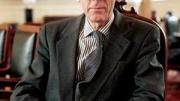In an afternoon conversation in Wadsworth House, where he had an office between his two terms of service as dean of the Faculty of Arts and Sciences (FAS), Jeremy R. Knowles once offered three metrics for assessing any Harvard dean’s performance. Were the professorial ranks stronger? Had students’ education improved? Were the financial underpinnings of the research and teaching sound?
Knowles judged that he had helped FAS fare well during his principal tour in University Hall, from mid 1991 to mid 2002—from the beginning of Neil L. Rudenstine’s presidency through the first year of Lawrence H. Summers’s. The faculty ranks, constant for more than three decades, began growing. The faculty reviewed the undergraduate concentrations and updated the Core curriculum. By beginning as a “wet-weather dean,” he had eliminated FAS’s persistent deficits while renovating essential facilities (the Yard dorms, Widener Library), putting the faculty in position late in the decade to make good use of the fruits of the University Campaign and strong endowment investment returns: new structures progressed, to house newly appointed professors in new fields, from genomics to engineering and the applied sciences. (See “A Dean for All Weathers,” May-June 2002, page 48.)
When Knowles resumed the deanship in 2006, at the request of Derek Bok, both men aimed mainly to maintain University business during their interim terms of service. Neither disclosed that Knowles was battling the prostate cancer that would force him to step down in the spring of 2007, and that ended his life this past April 3.
In the years since his own precise accounting of his leadership (as befit the Houghton professor of chemistry and biochemistry), Knowles’s FAS service has come to seem much more consequential in the eyes of his colleagues, hundreds of whom turned out at an enormous service held at Memorial Church on May 30, just before the events of Commencement.
In perspective, the faculty’s 20-plus-percent growth during the past 11 years is rooted in that earlier financial discipline and then growing confidence in an expanding intellectual agenda. The revision of the whole undergraduate curriculum initiated by Dean William C. Kirby built on the committees, processes, and College decanal structure Knowles put in place—all involving more faculty engagement in education and student life. The new science buildings now being occupied, and the vision for Allston as a community, not an academic enclave, all reflect his thorough involvement in academic planning and physical design.
At a family memorial service held on April 12 at Mount Auburn Cemetery, surrounded by Harvard friends (Jane Knowles retired as Radcliffe archivist in 2007), the Reverend Peter J. Gomes said, “[D]eans come and deans go, but some deans endure, and he was one of the enduring deans.” Knowles, he said, “brought to a lofty and often mechanical office a kind of generosity of spirit and liveliness of imagination, indeed, a nimbleness that made it fun to try to keep up with him.”
Sebastian Knowles ’83 remembered his father in a way that recalled both his fierce work ethic and his dry British humor. During a summer vacation in Rhode Island, Sebastian said,
Jeremy had fallen sick: he was always doing this on holidays—that’s how he was able to put in such long hours at work. So we left him in bed and played in the sun, until the telephone rang in the main house. This was 1976, when a phone ringing in a summer house was still something of a novelty. Dubiously, I lifted the receiver, to discover one of Dad’s graduate students on the line. He sounded excited. “Is Jeremy there?” “He’s sick.” “Could I speak with him?” “He can’t come to the phone, he’s too ill.” Pause. “This is his laboratory. Could you tell him that we’ve found retention in alkaline phosphatase?” I was 14, and had no idea what this meant—I still don’t. But I put down the receiver, raced outside to the little house where Jeremy lay, and clattered up the narrow stairs, shouting, “Dad! Dad! There’s been retention in alkaline phosphatase!” I was so pleased to be able to deliver this piece of incomprehensibly good news. He rolled his head towards me, fixed me with a baleful look, and whispered: “What percent?”
Sebastian’s brothers Julius and Timothy, Ed.D. ’02, also spoke. The latter summed up their father’s accomplished research on enzymes, distinguished leadership of the faculty, and role within his family—all characterized by helping enable others to fulfill themselves—as driven by the pursuit of “catalytic perfection.” Following the service, Jeremy Knowles was laid to rest on a hillside affording a panoramic view of Harvard—a community that appears genuinely grateful for his commitment to catalytic perfection on its behalf.









